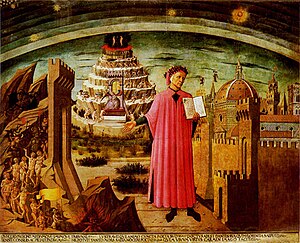 |
| Dante with his Comedìa; he stands between hell, purgatory, and Florence |
How important is literature to the culture of a given country? In what ways does a given culture value--and devalue--literature? In the United States, literature seems to be pushed aside so often as a scholastic chore and, come graduation day, an inutile afterthought. Reading seems to be flourishing--but my scope of "literature" here doesn't include Harry Potter or Fifty Shades of Grey. Just as surely as political figures are announcing that studying philosophy and the humanities in general is useless, they are funneling the sum total of the pittance allocated for education into STEM (science, technology, engineering, mathematics) subjects--oh, and the business schools, of course.
My closest foreign frame of reference is Italy. Undoubtedly a similar relegation of old (at least 100 years), dense (so that you could spend a lifetime thinking about it), and wildly imaginative (thrilling to the core, life-changing) literature is occurring in Europe. Yet there are differences, even among the ways previous generations have regarded la letteratura and la cultura. One of my favorite anecdotes in the history of modern languages is the story of how what we now consider modern Italian became the language of the new, unified kingdom, the amalgam of regions and city states brought together in the nineteenth century to form "the boot" in the middle of the Mediterranean.
Modern Italian is, actually, Tuscan--the form of Gallo-Italic language spoken in the city-state of Tuscany for hundreds of years. In fact, if you understand modern Italian and were to crack open a copy of Dante's Comedìa, you could read the text with near perfection, despite the fact that it was completed in 1320 CE! This fact is remarkable, but not coincidental. Because of the popularity throughout the Italian peninsula of Dante's incredible literary works--along with those of Francesco Petrarca (Petrarch, innovator of the sonnet form of poetry), Giovanni Boccaccio, and Niccolò Machiavelli--Tuscan, the language of a 14th century poet, was chosen as the national language when the country was unified in 1861. For a rough equivalency, imagine everyone in Great Britain reading newspapers, watching TV shows, and texting in the language that Chaucer wrote The Canterbury Tales!
Of course, the United States does not have an official national language--and I'm not arguing that issue one way or another. In many ways, the imposition of a language from one city-state onto an entire people is an affront to diversity, not to mention a highly problematic, and even authoritarian, appropriation of culture for nationalistic purposes. This is one of the potential pitfalls of strong cultural pride: a sense of superiority that can be manipulated by totalitarian leaders, as it was to horrific effect in Benito Mussolini's Kingdom of Italy.
But, in Italy, culture is also sacred, and there is much that is good about this reverence and respect for culture and literature that we Americans might take to heart. Italians care about their culture; they care about their food, their wine, their art, and their language. And, most importantly for my brief and limited purposes here, they care about their literature. I seriously doubt that Italian politicians will suggest that students stop learning Latin because it won't help them "in the workforce." And every day in school they will learn, and learn to love, the language of their country's greatest poet. A romantic notion, perhaps--but something to reflect on deeply as we make decisions about how we and our children will be educated in the 21st century.
No comments:
Post a Comment